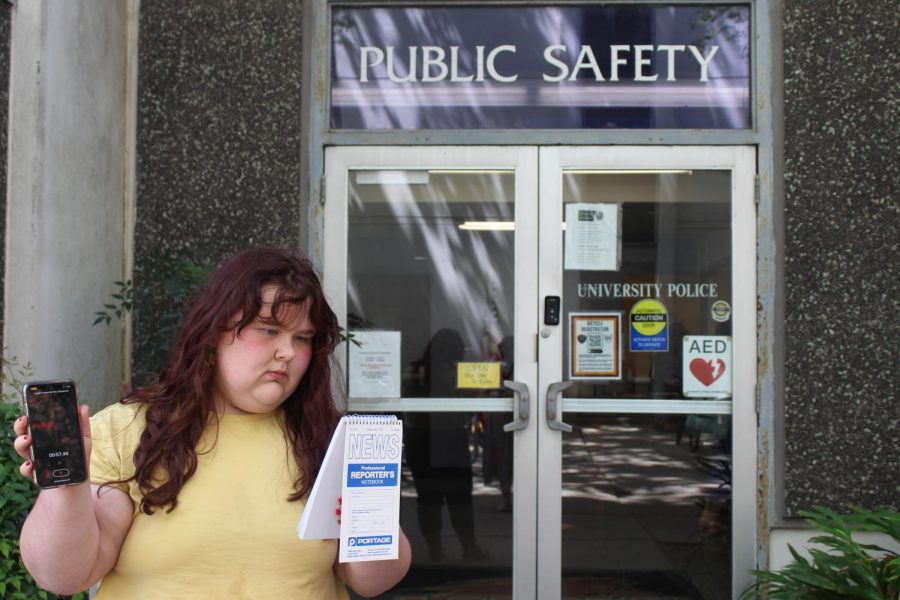Support comes in from across the country for Maroon reporter
Photo Illustration
April 21, 2023
Loyola has apologized and revoked all disciplinary measures against Maroon reporter Kloe Witt for reporting on a student’s arrest on campus last month, but voices across the nation still worry about the implications this has on student journalism.
Witt was found responsible for violating the student code of conduct for visibly recording a conversation between herself and Loyola officials in the university’s police department. After Maroon editors learned about the student’s arrest, University Police officials told The Maroon to send a reporter down to the station for more information.
Witt then identified herself at the locked University Police station door and was allowed in to report on the incident, which she recorded on her iPhone. Officials later complained that Witt did not expressly ask them for permission to record, despite the fact that the Code of Conduct only requires her to do so when there is a “reasonable expectation of privacy.”
The decision to punish Witt went under appeal but was denied, with Witt still required to prepare an essay on “consent in the digital age” or potentially face a $200 fine. The university also placed a formal warning on Witt’s disciplinary file, noting that more severe disciplinary action may be taken if another incident occurs.
However, Interim University President, The Rev. Justin Daffron S. J., wrote in a letter to Witt on Monday, April 17 that the student code of conduct was “at odds with long-standing journalism practices and applicable law” and that the university would dismiss all disciplinary proceedings against Witt and clear her record.
Daffron added that he was unaware The Maroon was supposed to report directly to the university president to maintain its independence.
“Had I known of my proper role, I would have made this controversy into a teaching moment for all involved, including myself,” he wrote. “I would have proactively moved to resolve the conflict between our student handbook and standard journalism practices.”
Professors weigh in
Law professor and University Senate Chair Isabel Medina said she was unaware that students are not always given the option of having their appeal considered by the University Board of Appeals.
Witt’s case was heard by a single administrative officer from the office of Residential Life rather than the University Board of Appeals — the body prescribed by both the Faculty Handbook and the Code of Conduct to arbitrate disputes.
She added that she didn’t know whether the outcome would’ve changed, but that the requirements of due process generally favor an approach that is not purely executive in nature and more reflective of the various interests engaged with the case.
“Because this is a case that involves educational activity supervised by faculty offered by one of the colleges, it would seem to require a process that includes faculty, not just review by a single administrator,” Medina said.
Medina added that in the case that the current disciplinary policies don’t include an automatic right to appeal to the University Board of Appeals, the University Senate might consider advising the Vice President for Student Affairs, the Provost, and the Interim President to alter the policies and acknowledge such a right to appeal.
Medina said that because the case involves educational professional norms, it’s important that the decision-makers be aware of what those norms are.
“Persons who have expertise in residential life may not have sufficient expertise in journalism norms and student journalism norms,” she said.
A significant impact of Loyola’s disciplinary sanctions, Medina said, is their influence on free speech and academic freedom.
“The press, and that includes the student press, has a valuable and important role to play in our society in making sure that the community is informed about matters of public importance,” she said. “It’s hard to see how what a police officer says to a reporter on a matter of public importance is private unless the police officer has asked to speak off the record.”
Medina said she plans to continue working with the university administration to ensure students’ academic freedom and educational interests are protected.
Michael Giusti has worked as a journalist for more than two decades, has been a member of the Society of Professional Journalists his entire career, and is Loyola’s Journalism Department chairman. He said that telling a source when an interview is being recorded is a good journalistic best practice.
“But it’s not a legal requirement in Louisiana, especially when the phone is out and in plain sight for everyone and after she identified herself as a reporter. And it’s certainly not required by any code of ethics,” Giusti said. “When we tell you we are recording, we are doing you a courtesy.”
Giusti also serves as Loyola’s director of student media, and he said in his 21 years working with The Maroon, he has never once seen the university use the student conduct procedures to police how The Maroon does its journalism.
“This is not only unprecedented, but it is shocking, and, quite frankly, chilling in its implications,” Giusti said.
Giusti served as Witt’s personal advocate through her disciplinary hearings, including her appeal.
“Through this whole process, Kloe never got a fair hearing or an honest assessment of her case,” Giusti said. “The deck has been stacked against her from the beginning.”
Amidst Witt’s case, organizations, university publications, and Loyola alumni have all spoken out against Loyola’s decision to penalize Witt.
“Chilling”
Lindsie Rank, the Student Press Counsel for the Foundation for Individual Rights and Expression, expressed her satisfaction with the university’s dismissal of charges against Witt but said she believes that the investigation, charges, hearing, appeal, and input from FIRE’s Student Press Freedom Initiative shouldn’t have been necessary for administrators to acknowledge their error.
“I’m worried that this sets the precedent that the student press really isn’t free at Loyola. I worry that student journalists will think twice before covering breaking news on campus, for fear of facing punishment for the simplest of things,” she said. “I worry that this isn’t even about Ms. Witt recording an interview, and is instead about the university wishing she wasn’t covering the arrest of a student at all, and I worry that the perception that Loyola is punishing a student journalist for publishing unflattering news will cast even more of a chilling effect on the student press.”
Similarly, President of the College Media Association, Chris Whitley, said that if the punishment had stood, recording an interview for a story that might cast the college in a negative light would be deemed a violation.
“That has a chilling effect on any college media organization,” he said.
Loyola might not be the first university to attempt to punish a student reporter. Whitley said he has observed that colleges are increasingly obstructing student journalists who are simply seeking information.
“It is a troubling trend that keeps students from learning their trade and dissuades them from wanting to enter the profession,” Whitley said. “It also deprives the campus community of the facts about what’s happening around them.”
Neighboring student papers show their support
It’s clear that not only professional, but student journalists place significant value on the freedom of the press. The punishment that Loyola imposed on Witt was met with disapproval from both students and journalists throughout Louisiana and the rest of the United States.
Tulane University’s college newspaper, The Tulane Hullabaloo, published a “Letter from the Board” on April 13 in support of Witt and the appeal of her case.
The letter insisted that the charge against Witt be dismissed and that the university’s administration should apologize for their “shameful attempt to control the press.”
“Loyola has a storied journalism program, but the university’s recent actions are shameful and careless,” the letter read. “The Tulane Hullabaloo is appalled that a fellow student journalist is facing discipline for simply doing their job.”
In addition, Louisiana State University’s college newspaper, The Reveille, published an editorial the same week titled, “The Reveille condemns Loyola University’s treatment of student reporter.”
The editorial read that they have faced administrative resistance to their reporting before, but they are dismayed to witness yet another university trying to penalize a student journalist for delivering news to her community.
“It seems that Loyola administrators are less concerned about the legal underpinnings of this case and more concerned about flexing their control over the student newspaper,” The Reveille reported. “The circumstances suggest that an administrator showed up to the police station, felt threatened by the reporter’s presence and reached for any policy they could use to discipline Witt and send a message to other student reporters.”
The concept of a university trying to suppress student journalism is concerning for many, and Laura Widmer, the executive director of Associate Collegiate Press, said that she and her organization stood in support of The Maroon regarding this issue.
“Administrators do not have the right to dictate coverage,” Widmer said. “This appears to be an attempt to censor student journalists and control the message.”
A learning lesson
Loyola’s student code of conduct states that students are not allowed to audio or video record someone without their prior knowledge or consent when the person or persons being recorded have a reasonable expectation of privacy.
However, Daffron’s letter read that he has become aware of a fundamental contradiction between the university’s code of conduct, which necessitates mutual agreement while recording, and the journalism principles and practices that our faculty teaches our student journalists.
Daffron wrote that he will bring together the relevant individuals from Student Affairs, the Mass Communication department, and The Maroon to revise the code of conduct in a considerate manner, ensuring that the university’s policies regarding personal privacy and professional journalistic standards are upheld.
“Loyola affirms its support for student journalists and the work of The Maroon staff. This
university-supported, award-winning publication serves our community and prepares
the next generation of talented journalists,” he wrote. “We value their work, and welcome an open line of communication with the entire community.”









